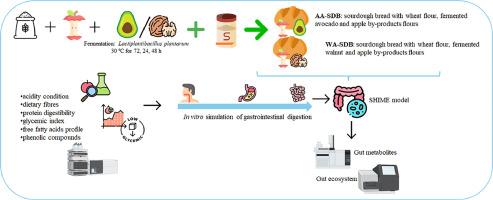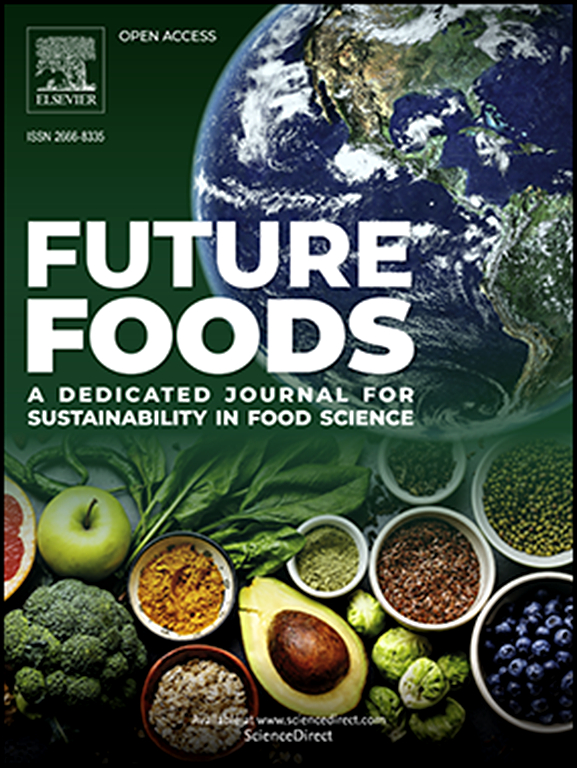New fermented plant-based ingredients in sourdough breads enhanced nutritional value and impacted on gut microbiota
IF 7.2
Q1 FOOD SCIENCE & TECHNOLOGY
引用次数: 0
Abstract
Two new recipes of baker's yeast bread fortified with fermented apple by-products and avocado or walnut were designed resulting in enhanced profiles of total free amino acids, in vitro protein digestibility (IVPD) and predicted glycemic index (pGI). Concurrently, pools of lactic acid bacteria and yeast were screened to select the most promising starters for sourdough preparation. The type II sourdough with Lactiplantibacillus plantarum CR1, Furfurilactobacillus rossiae CR5 and Saccharomyces cerevisiae E10 had the highest acidification and total free amino acids value, while resulting in bread with the highest IVPD and the lowest pGI.
Sourdough breads were manufactured with the new recipes. They had improved protein digestibility and starch hydrolysis, and enhanced content of dietary fiber, phenolics and unsaturated free fatty acids. The impact of new fortified sourdough breads on colon microbial ecosystems was investigated by the Simulator of the Human Intestinal Microbial Ecosystem (SHIME®). The intake promoted the short-chain fatty acids synthesis and expanded several bacterial taxa with potential to exert beneficial activities. The synergic combination of sourdough fermentation and fortification with fermented plant-based matrices (including by-products) was a suitable strategy to promote better nutritional and digestibility properties in breads, and to promisingly address the modulation of gut microbiota.

酸面包中的新型发酵植物配料提高了营养价值,并对肠道微生物群产生了影响
设计了两种添加了发酵苹果副产品、牛油果或核桃的面包酵母新配方,从而提高了总游离氨基酸、体外蛋白质消化率(IVPD)和预测血糖生成指数(pGI)。同时,还对乳酸菌和酵母菌池进行了筛选,以选出最有前途的酸包粉起始菌。使用植物乳杆菌 CR1、糠酸乳杆菌 CR5 和酿酒酵母 E10 的 II 型酸包粉具有最高的酸化度和总游离氨基酸值,同时能制作出最高 IVPD 和最低 pGI 的面包。采用新配方生产的酸包面包提高了蛋白质消化率和淀粉水解率,增加了膳食纤维、酚类物质和不饱和游离脂肪酸的含量。人体肠道微生物生态系统模拟器(SHIME®)研究了新强化酸面包对结肠微生物生态系统的影响。摄入酸面包促进了短链脂肪酸的合成,并扩大了几个具有潜在有益活性的细菌类群。酸包粉发酵与发酵植物基质(包括副产品)强化的协同组合是一种合适的策略,可提高面包的营养和消化性能,并有望解决肠道微生物群的调节问题。
本文章由计算机程序翻译,如有差异,请以英文原文为准。
求助全文
约1分钟内获得全文
求助全文
来源期刊

Future Foods
Agricultural and Biological Sciences-Food Science
CiteScore
8.60
自引率
0.00%
发文量
97
审稿时长
15 weeks
期刊介绍:
Future Foods is a specialized journal that is dedicated to tackling the challenges posed by climate change and the need for sustainability in the realm of food production. The journal recognizes the imperative to transform current food manufacturing and consumption practices to meet the dietary needs of a burgeoning global population while simultaneously curbing environmental degradation.
The mission of Future Foods is to disseminate research that aligns with the goal of fostering the development of innovative technologies and alternative food sources to establish more sustainable food systems. The journal is committed to publishing high-quality, peer-reviewed articles that contribute to the advancement of sustainable food practices.
Abstracting and indexing:
Scopus
Directory of Open Access Journals (DOAJ)
Emerging Sources Citation Index (ESCI)
SCImago Journal Rank (SJR)
SNIP
 求助内容:
求助内容: 应助结果提醒方式:
应助结果提醒方式:


